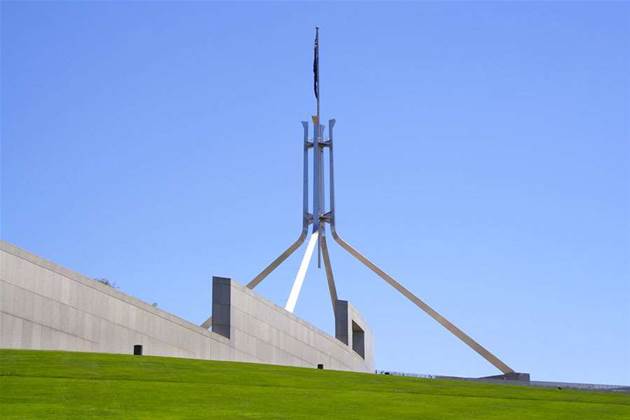The federal government’s Access and Assistance Bill has had a nasty collision with the powerful umpires of Australia's two houses of Parliament.

In a shock development that could yet recast the passage of the controversial bill, Senate President Senator Scott Ryan has written a stinging letter detaining concerns over its shortcomings to the chair of the Parliamentary Joint Committee on Intelligence and Security, Andrew Hastie MP.
The optics of the latest fissure within the Coalition are terrible for the government, not least because it could cause a grass roots revolt against parts of the bill from across the political spectrum.
The timing could not be worse either, with the Joint Committee set to meet today.
The letter from Ryan outlines a series of significant defects and deficiencies that essentially skewer the tangible operation of parliamentary privilege protocols that now stop authorities snatching information provided in confidence to parliamentarians in the course of their work.
Importantly, the letter bowls-up identical concerns from the lower chamber. That makes it a pox from both the houses. And it's more than a cranky note too; the letter specifically asks to be considered as a late submission to the crypto Bill's parliamentary inquiry.
Ryan's core concern is that the present operation of privilege means documents created or provided in confidence to parliamentarians are generally inaccessible to investigators in a similar way that communications between lawyers and their clients are protected in the legal process.
Representing politicians, Ryan wants a swag of carve outs applied to the new laws, should they come to pass.
A central issue raised by Ryan is that the covert nature of surveillance to needed obtain electronic information or evidence means that those politicians who might otherwise be able to exercise privilege wouldn't even know if they or their inbound sources are being intrusively bugged.
"The bill extends the use of intrusive powers in several ways," Ryan cautions, noting that some provisions "expand the circumstances where computer access warrants may be executed covertly".
The Senate President is concerned that the new powers as proposed will increase Australian Federal Police (AFP) powers to allow them to remotely and covertly search and seize evidence as opposed to fronting up at physical premise with a warrant - powers presently restricted to Australia Security Intelligence Organisation.
Ryan said such an expansion “sits in tension” with parliamentary privilege, the law that gives parliamentarians immunity from civil or criminal action, and examination in legal proceedings, while taking part in proceedings in Parliament.
The immunity from legal action is regarded as a fundamental check on the power of the executive branch of government because it allows elected representatives - for better or for worse - to publicly air material that may otherwise not be exposed to public sunlight.
"The main issue with covert access in relation to privilege (whether through remotely accessing the device or concealing physical access to it) is that there would be no opportunity for a parliamentarian who considers that material is protected by privilege to raise such a claim," Ryan says in the letter.
"Unlike search warrants applying to premises, computer access warrants and warrants used to secure remote access to devices are not served on any party with an interest, if they are served at all. There is therefore no trigger for anyone within the parliamentary sphere to seek to raise privilege. Neither is there a clear path for the resolution of such claims if they are made."
That’s a major problem for Ryan because he feels the Access and Assistance bill “sits in tension” with privilege. His letter notes that the bill doesn’t specifically change privilege, but that because it allows warrants to be executed in secret, a parliamentarian would not be in a position to use privilege to challenge or bounce a warrant.
While ASIO and the AFP are hot-to-trot for the new powers, lawmakers now appear less so, especially given a probable change of government could quickly turn today's leak hunters into quarry.
That was the actual scenario for the last big dust up with the cops over parliamentary privilege which came via the NBN and a tussle over documents held by a staffer of fomer Communications Minister Stephen Conroy.
Ryan notes in that case the memorandum of understanding setting out guidelines on the operation of protocols surrounding privilege put through its paces and didn't land on the side of law enforcement.
"The MOU and National Guideline were tested for the first time in the investigation of an alleged 'leak' from NBN during the 2016 election campaign. An inquiry by the Senate Privileges Committee found that documents seized in that matter were protected by privilege and should be withheld from the investigation," Ryan says.
"The committee also found that the manner in which the search warrants were executed constituted an improper interference with the functions of the parliament.In a subsequent inquiry, the committee examined shortcomings in the processes for the execution of search warrants where privilege may be involved, and the intersection between parliamentary privilege and the use of other intrusive powers.
"This included the question of how privilege may be secured when agencies are accessing and examining preserved metadata, which may be accessed without a warrant."
Ryan’s letter is richly ironic because critics of the bill have persistently pointed to unintended and unwelcome consequences once service providers and vendors are compelled to somehow intercept encrypted messages.
The toxicity of those unintended consequences from the Bill now extend to the inner workings of Parliament.
Ryan hasn’t suggested that timeline for the bill be changed, telling Hastie its impact on privilege can be dealt with through amendments or carve outs.
That said, getting the Bill through the upper house just became much, much harder.


_(23).jpg&h=140&w=231&c=1&s=0)
_(20).jpg&h=140&w=231&c=1&s=0)
_(28).jpg&h=140&w=231&c=1&s=0)
_(22).jpg&h=140&w=231&c=1&s=0)



_(26).jpg&w=100&c=1&s=0)

 iTnews Executive Retreat - Security Leaders Edition
iTnews Executive Retreat - Security Leaders Edition












_(1).jpg&h=140&w=231&c=1&s=0)



